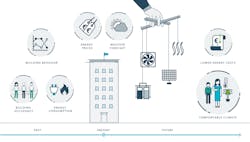What If Buildings Could Learn to Become More Energy Efficient?
Is it possible to use artificial intelligence (AI) to improve building comfort while also reducing building energy consumption? One company has figured out how to do that.
Building owners and building managers find that keeping tenants happy is a challenging task. Studies show that a comfortable indoor climate leads to happier, healthier and more productive building users. Keeping the comfort level high, while trying to reduce the energy consumption of the building’s installations seem to be conflicting interests that are hard to balance.
That’s why Priva has introduced a new cloud service: Priva Energy and Comfort Optimizer (Priva ECO). According to Leo Hitzert, Priva’s product manager, the company’s solutions enable clients to have “a comfortable indoor climate, while reducing their energy consumption. Unlike other solutions, Priva ECO doesn’t rely on building managers to do the actual work. The software service uses AI to interact with the building to balance energy consumption and comfort 24/7, fully automatic.”
Priva ECO is a cloud-based service that can be implemented as an add-on to existing building automation systems, from any vendor. Once configured, their intelligent software looks ahead 24 hours, calculating scenarios based on combinations of events (occupation rate, weather conditions, desired comfort levels, etc.) that are most likely to occur. It then uses these scenarios to make smarter use of the climate installations and the available energy sources of the building. Renewable and sustainable energy sources are used before other sources are activated, saving up to 25% of energy costs.
Priva uses the latest available technologies to deliver maximum comfort improvement at the lowest possible costs. A ‘digital twin’ of the building is created which is used to test all the different possible scenarios. Once the best scenarios are found, they are implemented in the actual building. The AI makes sure that the system can improve itself continuously.
A digital twin refers to a digital replica of a physical asset. In this case, a building. The digital twin reacts to changes the way the physical object would react. It is based on the building envelope: the skin of a building, such as construction materials, thermal dynamics and the technical installations. The physical object and digital twin are connected (data is exchanged between them). In the case of Priva ECO, the digital twin of the building is used to control and steer the physical building.
The AI inside Priva ECO is based on Microsoft Azure technology, and on smart algorithms developed by Priva’s technology team. This AI enables the software to learn about the behavior of a building and the influences of factors like:
- building usage and occupation rate
- internal heat load from people and machines
- weather conditions, like outside air temperature, sun and wind
- weather forecast for the next 24 hours
- measured room conditions for every room or zone
- desired room conditions
- changing supply of renewable energy sources
Based on all this information, Priva ECO predicts the exact behavior and needed setpoints to meet the desired climate conditions for the users of the building. The software will control the installations in such a way that a minimum of energy is needed to accomplish the optimal climate, while also taking energy prices into consideration.
Most building managers have to adjust the building automation system continuously to steer comfort. The innovation introduced by Priva ECO is like a self-driving car, doing all of this for building managers, creating the desired indoor climate while, at the same time, lowering energy consumption.
Priva is a Netherlands-based private tech company that develops hardware, software and services in the field of climate control, energy saving and optimal reuse of water. The company works in horticulture, indoor growing, and utility buildings such as offices, retail, hotels and hospitals. With offices in 13 countries and an international network of 400+ installation partners, Priva delivers solutions and services in more than 100 countries.
About the Author
Gordon Feller
Europe Insights Editor
Gordon Feller has spent the past 40 years working to create a sustainable energy future. Among his many roles, he served as an Obama appointee on a select U.S. Federal Commission, established by the U.S. Congress to focus on recommending actions to address the future of utilities, the grid, EVs and storage.

